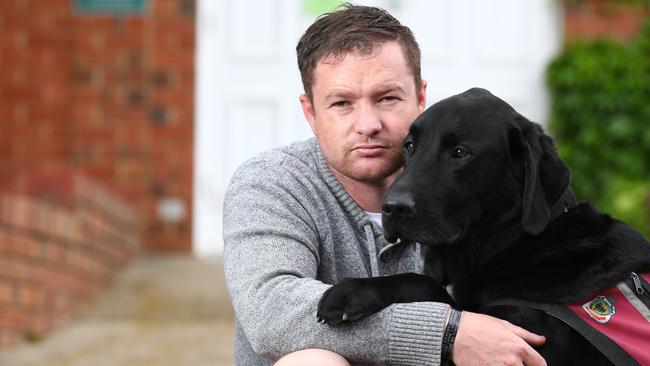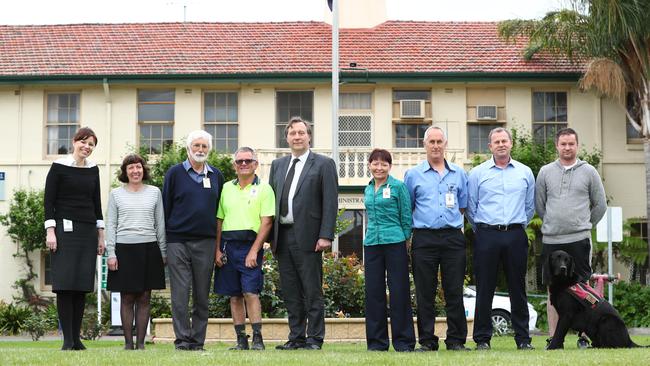Beloved ‘Repat spirit’ will live on after hospital closes forever
STAFF and patients recall their favourite memories of the South Australia’s beloved Repatriation General Hospital as it prepares to close for good next month.

SA News
Don't miss out on the headlines from SA News. Followed categories will be added to My News.
FOR war veterans such as Luke Adamson, the Repatriation General Hospital has been his saviour during his darkest hours.
Walking along dusty roads near Tarin Kowt in Afghanistan, worrying whether his comrades would step on a roadside bomb or fearing they were in the crosshairs of a Taliban sniper tucked away in the nearby hills was a regular part of his job as a combat engineer in the Australian Army.
“We’d find all the IEDs (improvised explosive devices) — there were a couple of close calls, as well as losing my mate (Sapper) Jamie (Larcombe),” he recalled.
Somehow, Mr Adamson survived.
But back home in Adelaide, the memories have never left him.
That’s where the dedicated staff at “The Repat” have been invaluable in helping the 31-year-old and thousands of South Australians during their tough times.
From helping heroic and scarred men and women back home from war zones to treating the dying with dignity, staff and patients have told the Sunday Mail the “Repat spirit” will live on long after the hospital closes its doors forever next month.

Mr Adamson only need gaze out of the windows of Ward 17 — where vets living with post-traumatic stress disorder are treated — to feel safe.
An abundance of roses in pretty pastel pinks, oranges and purples dot the sprawling manicured gardens.
There are pockets of fragrant rosemary from Gallipoli, hardy agapanthus and, out the front on Daws Rd, next to the hospital’s clock tower, palm trees sway in the breeze, all specially chosen and planted to aid patient recovery.
A heritage-listed chapel offers people a place of reflection, while others opt to sit in the quiet sanctuary of the peace or memorial gardens.
As a new era of healthcare dawns in South Australia — and the beloved Repat’s services are distributed between three sites across southern Adelaide — Mr Adamson recalled his memories of the place that has saved him.
After serving in the army as a combat engineer in Afghanistan, Sumatra and East Timor, he has spent time in the hospital’s specialised mental health unit, set up to treat veterans living with PTSD.
“People come if they need respite or if they’re struggling — it’s a safe space,” he said.
“Every time I come here, I have a bit of a stumble and they usually get back on your feet pretty quickly.”

While Mr Adamson said he will miss the hospital’s “friendly and happy staff”, he believed the new $15 million purpose-built Veterans Mental Health Unit at Glenside — named the Jamie Larcombe Centre after the SA sapper from Kangaroo Island who was killed in action in Afghanistan in February 2011 — was “fantastic”.
“I served with Jamie in the 1st Combat Engineer Regiment overseas ... it’s such a great honour to have someone like him, a contemporary veteran, to have a building named after him,” he said.
“It’s the first building that’s been named after a contemporary veteran in Australia so far.
“The new facility is fantastic. It’s exactly the same as Ward 17 — and 69 of the 70 staff are going over, and I believe it’s the staff that make the place.”
Many staff, such as The Repat’s veteran liaison officer, Darren Renshaw, have worked at the hospital complex for decades.
“When I first started 35 years ago, we had our World War I diggers, so we’ve seen them come and go,” he said.
“And now, with the World War II diggers, we’re getting to that point where we’re looking after the old guys who are in their late 90s and our contemporary veterans have been starting to come through here as well.”
Mr Renshaw’s job entails supporting veterans in any way he can, from booking appointments or “anything that makes their life just a little bit easier”.

He doesn’t play favourites but has fond memories of helping one of the state’s most well-known war vets, William (Bill) Schmitt, who died at The Repat in 2015, aged 97.
“He particularly touched my heart ... he was an icon of the veteran community,” Mr Renshaw said.
“He was a 2/3rd machine gunner during the war and, unfortunately, he was captured and ended up as a prisoner of war in Changi so, when the war was over, he was finally released and repatriated.
“The first hospital that he came back to in Australia was The Repat.
“He was a remarkable man, a beautiful soul and even though the adversity that he’d been through, he didn’t hold any hatred.”
Speaking to The Repat’s gardener, Andrew Clark, his deep affection is obvious for every corner of the grounds he lovingly tends.
“This rosemary that has been planted here came from Gallipoli. We actually strike a lot of plants from that,” he said, pointing to a hedge planted on the edge of the hospital’s peace garden.
“Over the years, we’ve planted a lot of flowers so patients can touch and smell them and their colour is what really has made the place.
“We did the work because of the patients and we know the history of the hospital and what it stands for and the veterans that have passed on.”

Nurse unit manager Debra Warne, who started working at The Repat when nurses still wore white caps and capes, shed a tear as she recalled her 32 years there.
“I never thought it would come to this — it’s a very surreal time,” she said.
Ms Warne has many special memories of her three decades treating patients, including a wedding in one of the wards.
“We had a wedding many years ago of a patient that was with us and he’d left his wife many years before and he was palliative,” she said.
“She was coming in to visit him and they wanted to get married again, so we had a wedding in the lunch room.
“We always used to have birthday cakes for the patients. We used to have stout for the patients — the doctors would write it up.
“There was always fish and chips on Fridays and patients wouldn’t go home because they wanted fish and chips.”
Ms Warne said she would “miss absolutely everything” about The Repat. “It doesn’t matter whether you’re a volunteer or an orderly, everyone respects each other and gets along extremely well — it’s been such an amazing place,” she said.
“We’ll always take those memories with us and we’ll always have those friends with us as well.”


